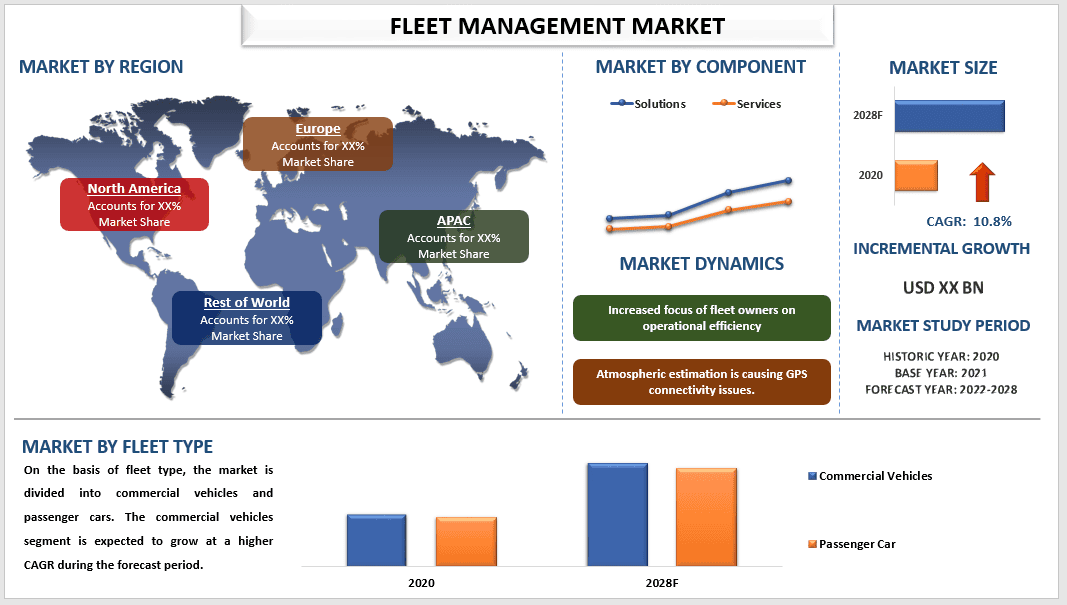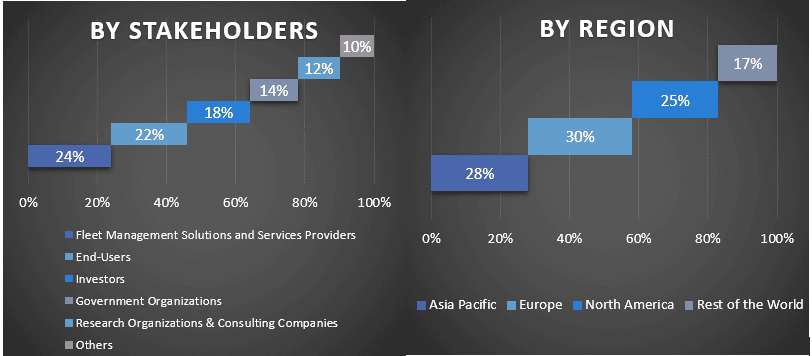- Home
- About Us
- Industry
- Services
- Reading
- Contact Us
Fleet Management Market: Current Analysis and Forecast (2022-2028)
Emphasis on Component (Solutions (Operation Management, Vehicle Management and Diagnostics, Performance Management, Fleet Analytics and Reporting, and Others) and Services); Fleet Type (Commercial Vehicles and Passenger Cars); Deployment (On-Premises and Cloud); and Region/Country

The global Fleet Management Market stood at USD 19 Bn in 2020 and is expected to grow at a CAGR of 10.8% during the forecast period. Fleet management is a broad term that encompasses the many actions and processes that must be undertaken to keep a fleet of five or more vehicles operating on time, within budget, and with maximum efficiency. This management system is used in a variety of private and public industries, with millions of vehicles worldwide managed on some kind of centralized software platform. The fleet management market is growing on the account of the high growth rate for the adoption of cloud computing and analytics, declining hardware and IoT connectivity costs, and a growing need for operational efficiency. factors such as the rising concerns about fleet safety, the need for operational competency in fleet management, the rapidly increasing number of fleets, and mandatory government regulations towards vehicle maintenance & tracking are also fueling the growth of the fleet management market. For instance, The Federal Motor Carrier Safety Administration (FMCSA), an agency in the United States Department of Transportation, develops and enforces data-driven regulations that balance motor carrier (truck and bus companies) safety with efficiency.
Some of the major players operating in the market include Geotab Inc., Trimble Inc., Verizon Communications Inc., Zebra Technologies Corporation, Wipro Limited, Cognizant Technology Solutions Corp, MiX Telematics International (Pty) Ltd, Vontier Corporation, LeasePlan Corporation N.V., and Element Fleet Management Corp. are some of the key players in the market. Several M&As along with partnerships have been undertaken by these players to facilitate customers with hi-tech and innovative products/technologies.
Insights Presented in the Report
“Amongst component, solutions segment to witness robust CAGR during the forecast period”
On the basis of component, the market is classified into solutions and services. The solutions segment is further divided into operation management, vehicle management and diagnostics, performance management, Fleet Analytics and Reporting, and Others. Among these, the solutions segment captured a prominent share of the market and is expected to grow at a substantial CAGR during the forecast period owing to the rising concerns about fleet safety. Safety is one of the top work challenges faced by fleet operators. Thus, due to the disastrous impact of accidents and other emergencies, the demand for fleet management solutions is expected to grow.
“Amongst deployment, on-premises captured a prominent share of the market in 2020”
Based on deployment, the market is divided into on-premises and cloud. The on-premises segment catered to a prominent share of the global fleet management market. The growth in this segment can be attributed to the high speed and low latency abilities of on-premises deployment. On-premises deployment is preferred by organizations, which are looking for high performance for multiple types of workloads. Furthermore, the direct cost is more with an on-premises deployment but the whole cost of ownership may be lesser, which means after removing the direct costs, the only ongoing costs are energy and maintenance.
“North America held a significant share in the market in 2020”
North America held a prominent share of the fleet management market. The government of this region has played an extremely significant role in increasing the market for fleet management in recent years. The strict regulations and rules in the North American region have successfully reduced the number of emissions that come through the use of vehicles. And in order to reduce the pollution caused by vehicles, the stringent regulations are compelling the industry to adhere to the policies. Hence the fleet management market in the region is expected to grow at a significant growth rate.
Reasons to buy this report:
- The study includes market sizing and forecasting analysis validated by authenticated key industry experts.
- The report presents a quick review of overall industry performance at one glance.
- The report covers an in-depth analysis of prominent industry peers with a primary focus on key business financials, product portfolios, expansion strategies, and recent developments.
- Detailed examination of drivers, restraints, key trends, and opportunities prevailing in the industry.
- The study comprehensively covers the market across different segments.
- Deep dive regional level analysis of the industry.
Customization Options:
The global fleet management market can further be customized as per the requirement or any other market segment. Besides this, UMI understands that you may have your own business needs, hence feel free to connect with us to get a report that completely suits your requirements.
Table of Content
Research Methodology for the Fleet Management Market Analysis (2022-2028)
Analyzing the historical market, estimating the current market, and forecasting the future market of the global fleet management market were the three major steps undertaken to create and analyze the adoption of fleet management in major regions globally. Exhaustive secondary research was conducted to collect the historical market numbers and estimate the current market size. Secondly, to validate these insights, numerous findings and assumptions were taken into consideration. Moreover, exhaustive primary interviews were also conducted, with industry experts across the value chain of the global fleet management market. Post assumption and validation of market numbers through primary interviews, we employed a top-down/bottom-up approach to forecasting the complete market size. Thereafter, market breakdown and data triangulation methods were adopted to estimate and analyze the market size of segments and sub-segments of the industry pertains to. Detailed methodology is explained below:
Analysis of Historical Market Size
Step 1: In-Depth Study of Secondary Sources:
Detail secondary study was conducted to obtain the historical market size of the fleet management market through company internal sources such as annual reports & financial statements, performance presentations, press releases, etc., and external sources including journals, news & articles, government publications, competitor publications, sector reports, third-party database, and other credible publications.
Step 2: Market Segmentation:
After obtaining the historical market size of the fleet management market, we conducted a detailed secondary analysis to gather historical market insights and share for different segments & sub-segments for major regions. Major segments are included in the report as component, fleet type, and deployment. Further country-level analyses were conducted to evaluate the overall adoption of testing models in that region.
Step 3: Factor Analysis:
After acquiring the historical market size of different segments and sub-segments, we conducted a detailed factor analysis to estimate the current market size of the fleet management market. Further, we conducted factor analysis using dependent and independent variables such as component, fleet type, and deployment of fleet management. A thorough analysis was conducted for demand and supply-side scenarios considering top partnerships, mergers and acquisitions, business expansion, and product launches in the fleet management market sector across the globe.
Current Market Size Estimate & Forecast
Current Market Sizing: Based on actionable insights from the above 3 steps, we arrived at the current market size, key players in the global fleet management market, and market shares of the segments. All the required percentage shares split, and market breakdowns were determined using the above-mentioned secondary approach and were verified through primary interviews.
Estimation & Forecasting: For market estimation and forecast, weights were assigned to different factors including drivers & trends, restraints, and opportunities available for the stakeholders. After analyzing these factors, relevant forecasting techniques i.e., the top-down/bottom-up approach were applied to arrive at the market forecast for 2027 for different segments and sub-segments across the major markets globally. The research methodology adopted to estimate the market size encompasses:
- The industry’s market size, in terms of revenue (USD) and the adoption rate of the fleet management market across the major markets domestically
- All percentage shares, splits, and breakdowns of market segments and sub-segments
- Key players in the global fleet management market in terms of products offered. Also, the growth strategies adopted by these players to compete in the fast-growing market
Market Size and Share Validation
Primary Research: In-depth interviews were conducted with the Key Opinion Leaders (KOLs) including Top Level Executives (CXO/VPs, Sales Head, Marketing Head, Operational Head, Regional Head, Country Head, etc.) across major regions. Primary research findings were then summarized, and statistical analysis was performed to prove the stated hypothesis. Inputs from primary research were consolidated with secondary findings, hence turning information into actionable insights.
Split of Primary Participants in Different Regions

Market Engineering
The data triangulation technique was employed to complete the overall market estimation and to arrive at precise statistical numbers for each segment and sub-segment of the global fleet management market. data was split into several segments & sub-segments post studying various parameters and trends in the areas of component, fleet type, and deployment in the global fleet management market.
The main objective of the Global Fleet Management Market Study
The current & future market trends of the global fleet management market were pinpointed in the study. Investors can gain strategic insights to base their discretion for investments on the qualitative and quantitative analysis performed in the study. Current and future market trends determined the overall attractiveness of the market at a regional level, providing a platform for the industrial participant to exploit the untapped market to benefit from a first-mover advantage. Other quantitative goals of the studies include:
- Analyze the current and forecast market size of the fleet management market in terms of value (USD). Also, analyze the current and forecast market size of different segments and sub-segments
- Segments in the study include areas of component, fleet type, and deployment
- Define and analysis of the regulatory framework for the fleet management industry
- Analyze the value chain involved with the presence of various intermediaries, along with analyzing customer and competitor behaviors of the industry
- Analyze the current and forecast market size of the fleet management market for the major region
- Major countries of regions studied in the report include Asia Pacific, Europe, North America, and the Rest of the World
- Company profiles of the fleet management market and the growth strategies adopted by the market players to sustain in the fast-growing market
- Deep dive regional level analysis of the industry
Related Reports
Customers who bought this item also bought










